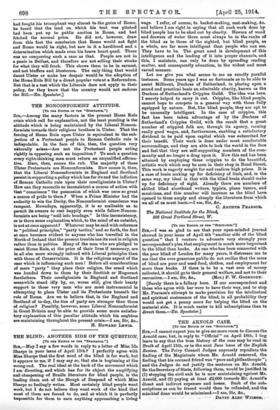THE NONCONFORMIST ATTITUDE. [To Tax EDITOR OR TRR .. EDSCTAT01..1
Sia,—Among the many factors in the present Home Rule crisis which call for explanation, not the least puzzling is the attitude which is being maintained by the Liberal Noncon- formists towards their religions brothers in Ulster. That the forcing of Home Rule upon Ulster is equivalent to the sub- jection of a Protestant people to Roman Catholic rule is indisputable. In the face of this, then, the question very naturally arises—Are not the Protestant people acting rightly in opposing such an imposition P To such a question every right-thinking man must return an unqualified affirma- tive. Here, then, comes the rub. The majority of these Ulster Protestants are Nonconformists. How comes it, then, that the Liberal Nonconformists in England and Scotland persist in supporting a policy which has for its end the infliction of Roman Catholic rule upon their coreligionists in Ulster? How can they reconcile so inconsistent a course of action with that " conscience " the possession of which was once so great a source of pride to them P When a Prime Minister had the audacity to win the Derby, the Nonconformist conscience was rampant Nowadays, apparently, it is so malleable as to permit its owners to rest happily even while fellow-Noncom formists are being "sold into bondage." Is this inconsistency, or is there some explanation which, to the mind of an outside; is not at once apparent? Whatever may be said with reference to " political principles," "party tactics," and so forth, the fact at once becomes evident to anyone who has travelled in the North of Ireland that the present trouble has its root in religion rather than in politics. Many of the men who are pledged to resist Home Rule, at the price of their lives if necessary, are in all else more strongly imbued with Liberal principles than with those of Conservatism. It is the religious aspect of the ease which is influencing such men I Before all considerations of mere " party " they place their religion, the creed which Was banded down to them by their Scottish or Huguenot forefathers. Their coreligionists in England and Scotland meanwhile stand idly by, or, worse still, give their hearty support to those very men who are most instrumental in attempting to place Ulster and its Protestants beneath the rule of Rome. Are we to believe that, in the England and Scotland of to-day, the ties of party are stronger than those of religion? Possibly, however, some Liberal Nonconformist in Great Britain may be able to provide some more satisfac- tory explanation of this peculiar attitude which his confreres are maintaining throughout the present crisis.--I am, Sir, &e., H. HOWARD LEWIS.


























































 Previous page
Previous page